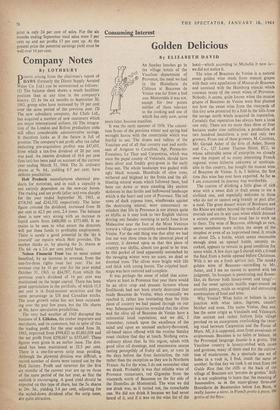Company Notes
By LOTHBURY
p()NTS arising from the chairman's report of DAWS (formerly the Direct Supply Aerated Water Co. Ltd.) can be summarised as follows: (1) The balance sheet shows a much healthier position than at any time in the company's history. (2) In the six months to September 30, 1963, group sales have increased by 19 per cent over the same period of the previous year. (3) The new subsidiary company, Air Chefs Ltd., has acquired a number of new customers which are major international airlines. (4) The integra- tion of the London and Bolton production units will effect considerable administrative savings. It therefore looks as if the future is full of promise. The company's net profit after tax (after deducting pre-acquisition profits) was £47,695, from which a tax-free dividend of 20 per cent was paid. An interim dividend of 16.6 per cent (less tax) has been paid on account of the current year ending March 31, 1964. The 2s. ordinary shares at 9s. 6d., yielding 6.7 per cent, have definite possibilities.
Holt Products manufactures chemical pro- ducts for motorists, and in such a capacity is not entirely dependent on the new-car boom. The trading and net profit (after tax) rose sharply for the year ended September 30, 1963, at £518,943 and £242,332 respectively. The latter figure covered the dividend, increased from 30 per cent to 42.5 per cent, 2.4 times. The balance sheet is now very strong with an increase in liquid assets from £400,000 to £571,000. It re- mains to be seen to what extent the directors will put these funds to profitable employment. There is surely a good potential in the 'do it yourself' car repairs which Holt provides. The market thinks so, by placing the 2s. shares at 33s. 6d. on a 2.6 per cent yield basis.
Nelson Financial Trust has to some extent benefited, by an increase in revenue, from the one-for-three rights issue last year. The net revenue rose by 16 per cent for the year ended October 31, 1963, to £64,787, from which the previous year's dividend of 14 per cent was maintained on the larger capital. There has been good appreciation in the portfolio, of which 11.5 per cent is in fixed-interest securities and the same percentage in US and Canadian stocks. The asset growth value has not been outstand- ing over the past few years, but the 10s. shares at 30s. have speculative possibilities.
The very bad weather of 1963 disrupted the business of J. Gliksten, the timber importers and merchants, and its customers, but in spite of this the trading profit for the year ended June 30, 1963, improved from £998,821 to £1,001,038 and the net profit from £298,667 to £353,447. These figures were given in an earlier issue. The divi- dend has been maintained at 32.5 per cent. There is a one-for-seven scrip issue pending. Although the plywood division was difficult, a record number of doors were turned out by the Hull factory. Profit and turnover for the first six months of the current year are up on those of the same period of the last year, so that the outlook is encouraging. A good yield should be expected on this type of share, but the 5s. shares at 26s. 3d., yielding 5.4 per cent, adjusting for the scaled-down dividend after the scrip issue, are quite attractive.


































 Previous page
Previous page